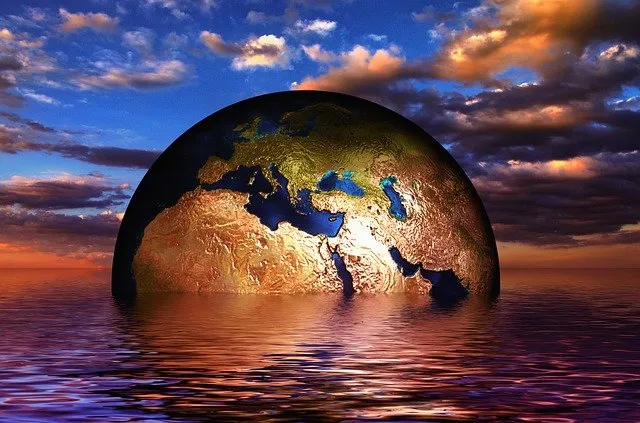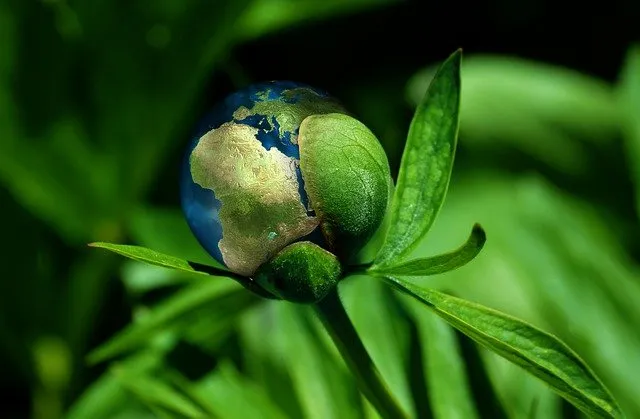
El cambio climático es un tema álgido. Es difícil ponerse de acuerdo en que es lo que está afectando directamente al mismo, son muchos los factores involucrados.
Desde la formación del planeta Tierra, este ha atravesado diferentes cambios extremos. Basta leer la historia: las glaciaciones, la emergencia de islas, continentes o el hundimiento de las mismas. Esto sucede cada cierto tiempo, miles de años, independientemente de la actividad humana.
Los ciclos climatológicos de nuestro planeta son evolutivos, se repiten influenciados entre otros por el sol. Son cambios cíclicos que se suceden en el planeta. Y en este momento nos tocó, a nosotros, vivirlo... Pero, al mismo tiempo, tenemos que considerar que desde hace mucho tiempo, el ser humano, está degradando el ambiente. En eso voy a basar mi publicación.
La competencia por la energía es, generalmente, la causa de los conflictos. Los humanos podemos ser más amigables con nuestro entorno; lo primero que tenemos que hacer es tomar conciencia para poder introducir los cambios necesarios. Estos se ejecutarían, poco a poco, en las comunidades donde vivimos. A continuación les cito, algunas, con las que comenzaría en la zona donde vivo:
EL RECICLAJE. Inicio con este tópico porque es el que, quizás, podamos implementar de inmediato. Para ello comenzaría explicando a la comunidad lo que significa el reciclaje y cómo podemos hacerlo. En este reciclaje incluiría: prendas de vestir, vidrio, papel, plástico, artefactos eléctricos y electrónicos dañados, comida sobrante.
Las prendas de vestir, en buen estado, se le puede dar nueva vida realizando con ellas nuevos diseños que podamos seguir usando posteriormente.
Las comidas sobrantes se regalan al más necesitado o se usan al día siguiente, para otras recetas, agregándole otros condimentos e ingredientes. En el caso de las conchas, semillas y cualquier material vegetal que no usemos, estos deben ser depositados en un envase adecuado para su descomposición. Luego de cierto tiempo se podrá usar como abono para las plantas.
El plástico se puede volver a reutilizar y, cuando queremos botarlo, debemos colocarlo en contenedores para tal fin. Lo mismo se haría con el vidrio. Con respecto a los artefactos, estos deberían acomodarlos y si ya finalizó su vida útil y no se pueden arreglar se debería desmenuzar sus componentes que quizás sirvan para repuestos para complementar otros aparatos. Por último descartarlos en un lugar adecuado.
CONSUMO ELÉCTRICO. Aquí habría que establecer campañas, por diferentes medios de comunicación, para concientizar a la gente. Lo más sencillo es usar la electricidad que necesitemos en el momento. Por ejemplo, comer en familia, de esa manera solo se usa el bombillo donde esté toda la familia. Solo prender la luz en el momento que se va a usar. Desenchufar los aparatos eléctricos que no estemos usando. Si usamos gas este debemos usarlo solo en el momento de cocinar y, apagarlo cuando terminemos de preparar los alimentos.
CULTIVOS ORGÁNICOS. Consisten en cultivar las plantas sin productos químicos. Las hortalizas y verduras deberían sembrarlas cerca de los centros poblados, de esa manera se ahorra energía. Las personas que tengan patios donde cultivar deberían sembrar alimentos para el autoconsumo. Los que carezcan de ello podrían sembrar en potes plásticos algunas hortalizas y plantas aromáticas que sirvan para sazonar las comidas y, también, como medicinales.
TRANSPORTE. Usar preferiblemente transporte público. Si se usa el carro particular deberían ponerse de acuerdo los vecinos, que van a lugares cercanos, y viajar todos juntos. Comprar los alimentos en la zona cerca a donde vivimos. De esa manera se ahorra combustible.

ENGLISH VERSION

Climate change is a hot topic. It is difficult to agree on what is directly affecting it, there are many factors involved.
Since the formation of the planet Earth, it has gone through different extreme changes. It is enough to read history: glaciations, the emergence of islands, continents or the sinking of them. This happens every so often, thousands of years, regardless of human activity.
The climatological cycles of our planet are evolutionary, they repeat themselves, influenced among others by the sun. They are cyclical changes that occur on the planet. And at this moment it is our turn to live it.... But, at the same time, we have to consider that for a long time, human beings have been degrading the environment. This is what I am going to base my publication on.
Competition for energy is usually the cause of conflicts. Humans can be friendlier to our environment; the first thing we have to do is to become aware of it in order to introduce the necessary changes. These would be implemented, little by little, in the communities where we live. Here are some of them, with which I would start in the area where I live:
RECYCLING. I start with this topic because it is the one that, perhaps, we can implement immediately. I would begin by explaining to the community what recycling means and how we can do it. In this recycling I would include: clothing, glass, paper, plastic, damaged electrical and electronic appliances, leftover food.
Clothing, in good condition, can be given new life by making new designs that we can continue to use later.
Leftover food can be given to the needy or used the next day for other recipes, adding other seasonings and ingredients. In the case of shells, seeds and any vegetable material that we do not use, these should be deposited in a suitable container for decomposition. After a certain period of time they can be used as fertilizer for plants.
Plastic can be reused again and, when we want to throw it away, we should place it in containers for that purpose. The same would be done with glass. With respect to the appliances, they should be arranged and if their useful life is over and they cannot be repaired, their components should be shredded and perhaps used as spare parts to complement other appliances. Finally, they should be discarded in a suitable place.
ELECTRIC CONSUMPTION: Here it would be necessary to establish campaigns, by different means of communication, to make people aware. The simplest thing to do is to use the electricity we need at the moment. For example, eating meals as a family, that way we only use the light bulb where the whole family is. Only turn on the light when you are going to use it. Unplug electrical appliances that we are not using. If we use gas, we should use it only when cooking and turn it off when we finish preparing the food.
ORGANIC CROPS. They consist of cultivating plants without chemical products. Vegetables and greens should be grown close to population centers, thus saving energy. People who have backyards where they can grow crops should grow food for their own consumption. Those who do not have it could plant some vegetables and aromatic plants in plastic pots to season meals and also as medicinal plants.
TRANSPORTATION. Preferably use public transportation. If private cars are used, neighbors who go to nearby places should agree to travel together. Buy food in the area near where we live. This saves fuel.
Translated with www.DeepL.com/Translator (free version)